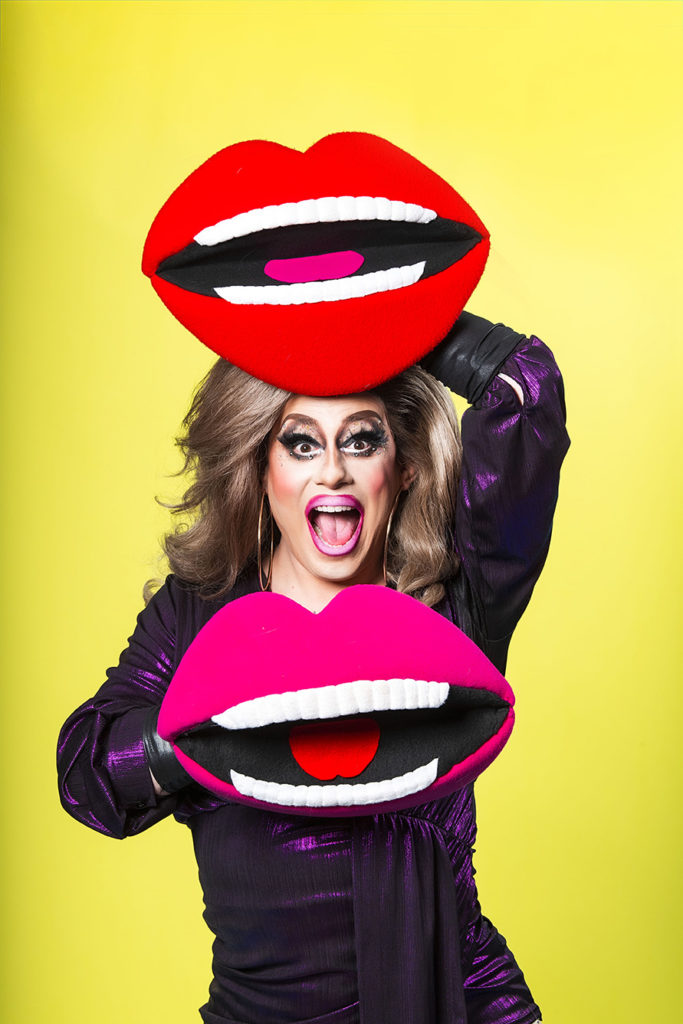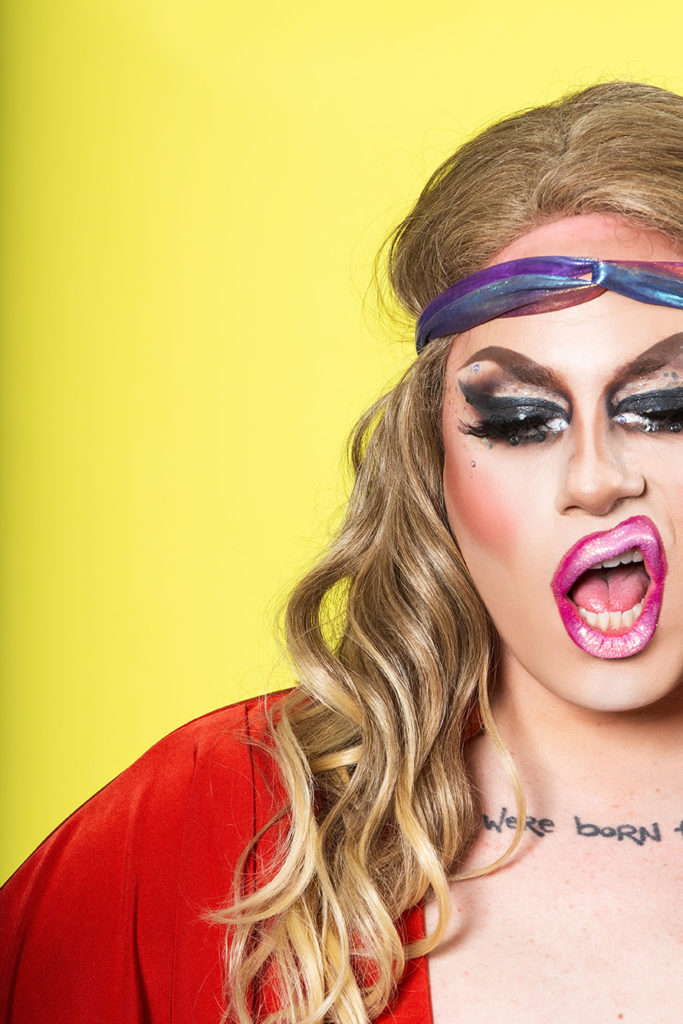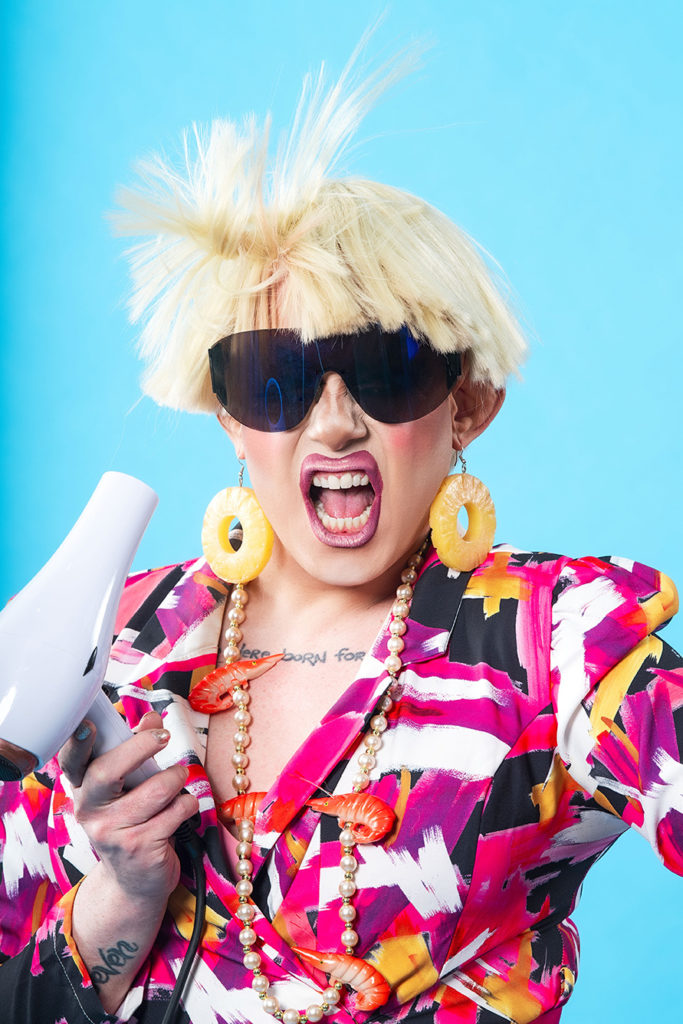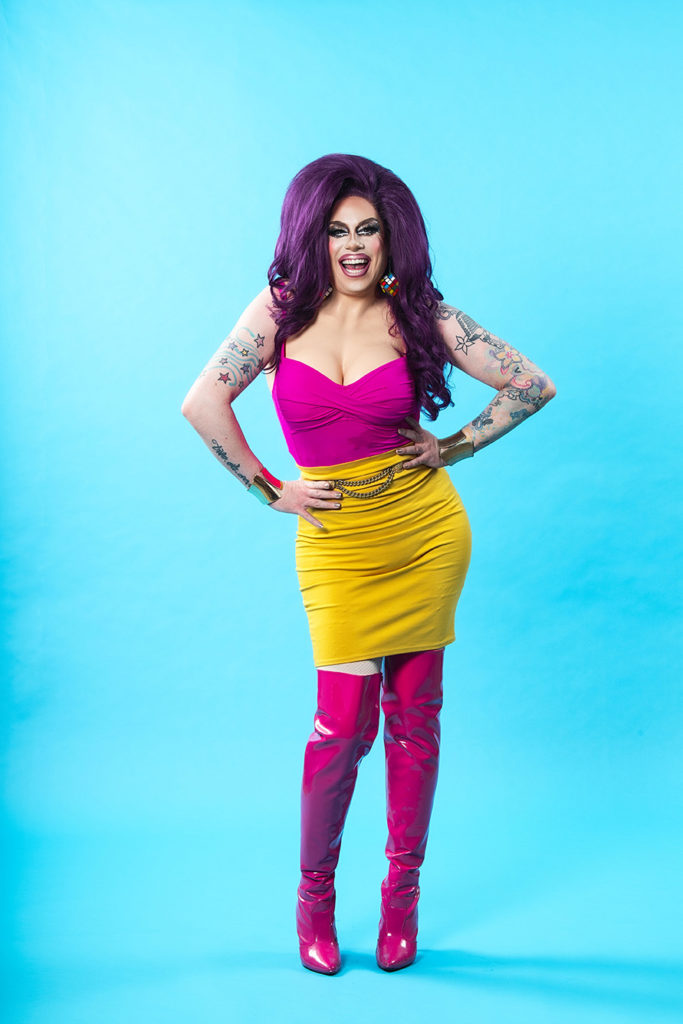Drag Queen Cherry Lemonade Takes the Show on the Road
During the pandemic, the veteran drag performer joined with fellow performer Gigi Gabor to create Curbside Queens, a traveling drag show.

When the COVID-19 pandemic forced businesses to shut down in early 2020, drag performers were not spared. Portland-based drag queen Cherry Lemonade saw on Facebook that a drag performer in Virginia was doing pop-up shows at people’s houses, so she messaged her to ask permission to use her idea. “She was like, ‘Please! Get that paper,’” Lemonade says. Lemonade teamed with another veteran of Portland’s drag scene, Gigi Gabor, to create a mobile, outdoor drag show. It was originally called Two Queens, One Driveway, and they would show up in Gabor’s Yukon Denali with a long copper pipe holding a glittery curtain. The venture was so successful, the following year they bought a bus, painted it pink, and rebranded as Curbside Queens. They performed 85 gigs in 2021 and have created a new show for this year. “Even with the venues coming back,” Lemonade says, “people still wanted what we were offering, which was really wild.”
What attracted you to music?
I didn’t sing a note until junior year in high school. I took chorus as an elective and very quickly was placed out of it. They moved me into the advanced chorus within a month or so. And I was like, Okay, this is neat. No one’s specifically told me that I’m good at something. I grew up in a sports family. I was sort of just force-fed sports for most of my life, and I just didn’t identify with it.
Had you done any kind of performing before?
Rec camp was a big thing for us when I was a kid. They had tons of activities for us to do, and we had a big lip sync competition every year. I was always fighting for the starring role, and I would always get it because nobody else really cared. I cared way too much. I thought it was the coolest thing ever, and who knew that it would lead to a career in lip syncing?

How did you get into drag?
Necessity. I was stripping at the time, and there was a costume contest. It was a $100 grand prize, so my cousin, who’s five-two, let me borrow one of her dresses. I crammed myself into this stupid-looking dress from Deb and put on this wig that looked like Tina Turner hair, but it was neon yellow, or neon pink. I didn’t have tights, I wore sneakers, I didn’t shave my legs or armpits or anything. And I went out, and I was the only person who entered, so I won. You won a $100 cash prize, and then you also got a paid booking in the next show. So, I had no choice, really, and then they kept paying me, so I kept doing it. It became a way for me to take all the things I was good at and just hyperfocus on them.
How challenging was it to turn drag into a full-time career?
I was watching an interview with somebody, and they were asked the best advice they could give, and they said, “Know what you’re worth and demand three times that.” The second I heard that, I was like, screw it, I’m going to charge more, and they’re going to pay it, because I’ll bring in business. If you’re going to ask for a certain amount of money, you can’t be showing up with hairy legs, and you have to buy better wigs. You have to start producing better content. Now, I feel like I’ve gotten to a point where my reputation precedes me, and people know what they’re going to get out of a show of mine, so I can go into any venue and just be like, “Hi, what’s your scheduling look like, because I would like to do this day.” And I more often than not can get it, which is cool. I started making things happen because what’s the point of me sitting around, waiting for opportunities, when you could just create them yourself?

“Shove some Smartwools in a bra and call it a boob. That’s the way we do drag in Maine, baby.”
What was the drag scene in Portland like when you first started?
More irreverent, that’s for sure. It was all dick jokes, and it was all making the straight guy in the audience uncomfortable. That wasn’t ever for me. I always felt that was kind of weird. I don’t understand ostracizing people and making them feel unwelcome, or they’re only welcome on our terms. Our terms should only be, don’t touch me unless I give you permission to. That’s it. I’m there to entertain you. I’m not there to make you feel weird and uncomfortable. So, it’s changed a lot in that aspect, which I rather like. The meanness of drag queens is gone, I think.
How has RuPaul’s Drag Race changed people’s perception of drag?
It’s a big shift because it made it less scary for typically straight audiences to experience drag from the comfort of their own homes. And it forced everybody to get creative, because back in the day, you would just get up, lip sync a Mariah number, lip sync a Whitney number, whatever, and then just stand there and collect money. It was dumb. You didn’t have to do as much then. With Drag Race, I appreciate the fact that they’re putting the most creative and the most talented performers in the world on TV for everyone to see, because it’s forcing the rest of us to have to be better. It sucks, though, because you are constantly compared to them, all the time.

What was it about drag that spoke to you compared to other performing arts?
The creativity behind it. When you’re doing a music gig, there’s a certain degree where people take themselves pretty seriously. I don’t have to take myself seriously when I’m doing drag. I get to goof off. I have so many numbers where I’ve just inserted fart noises for fun, because it makes me laugh, and I’m thinking the whole time, People are paying me to do this. People are paying me money for this. I bought a car with fart noises. Also, it’s so much fun to play with gender. Back in the day, it was all about how much could you look like a woman? And now, a bunch of my friends, most of the queens in town lately, have hairy chests and beards and stuff, and I think it’s so much fun. I just love the idea of flipping gender on its head. Still aspiring to have that hourglass shape, but sometimes I don’t want to. Sometimes I’ll wear a mumu and a wig that’s just sticking out in all different places, and still paint my face really pretty. It’s just, whatever I’m in the mood to do that day, I get to get it out of my system artistically through drag. You don’t get to do that if you’re in a wedding band or something like that.
Who are the type of customers who book Curbside Queens?
We’ve had bachelorette parties, we’ve had birthdays. Birthdays are a big one. Some people are just having a barbecue. We’ve done block parties. We’ve done some weird shit. We pulled up at two different spots, and there were just chickens running around. We’ll go to anywhere. We’ve done farms. We blocked off St. Lawrence Street on the East End, and everybody was hanging out their windows, like it was a musical. Everyone’s coming out and dancing with us. It was only supposed to be for this one house, and the whole block joined the party. People will surprise their friends with it. When a 50-minute drag show literally rolls up to your driveway, and you’re just like, “What the hell’s about to happen?”

Read More:
- The Immortal Life of Holly Meade

- “Beyond the Brick” Brings Maine-Made Art and Music to Life

- Watercolor Painter Abe Goodale Traces His Roots on 700 Acre Island

- Shifting Dynamics Through the Power of Theater


